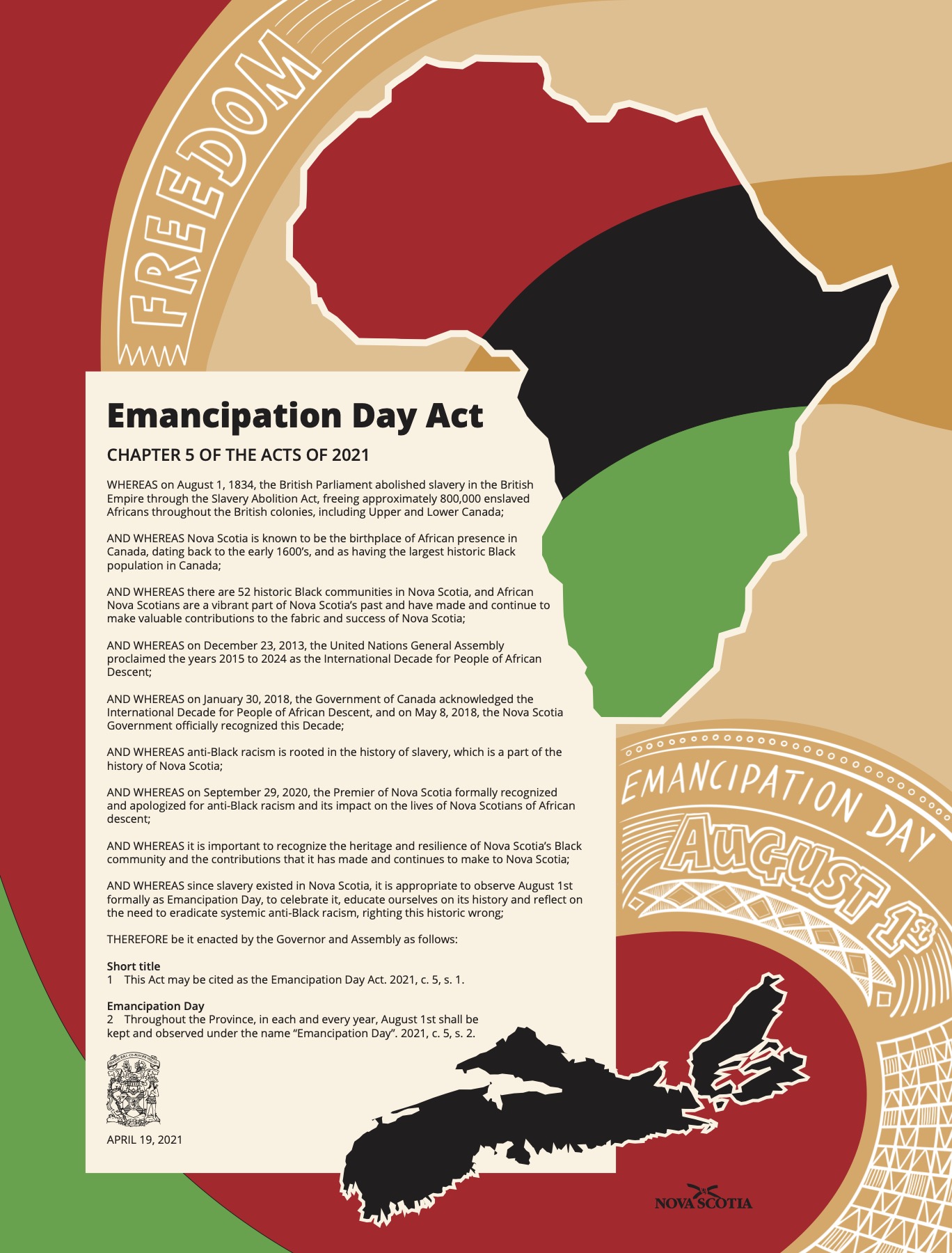
On August 1, Canada recognizes Emancipation Day, commemorating the significant moment when the Slavery Abolition Act of 1834 came into effect. The Act finally brought an end to centuries of legal enslavement of African people and their descendants across the British Empire, including here in Nova Scotia.
Acknowledging the Past, Confronting the Present
Embracing Emancipation Day allows us to confront the enduring legacy of anti-Black racism and the profound impacts of slavery. It is a time to honour the resilience and leadership of individuals of African descent who fought for systemic change, paving the way for the abolition of slavery and the realization of Emancipation Day.
As social workers practicing through an intersectional lens, it is imperative to recognize that slavery has played a pivotal role in perpetuating anti-Black racism in present-day Canada. The dehumanization and commodification of African individuals during the era of slavery have ingrained beliefs of racial inferiority that continue to fuel stereotypes and prejudices across generations.
Addressing Systemic Inequalities & Pursuing Reparations
The historical trauma of enslavement reverberates through ongoing systemic inequalities, racial discrimination, and cultural marginalization experienced by people of African descent in Nova Scotia. Discriminatory practices and systemic racism shape socio-economic and political structures, resulting in disparities faced by Black communities, including limited economic opportunities, resource access challenges, and racial profiling incidents.
Towards Healing and Justice: The Imperative of Reparations
Recognizing reparations as both a moral and material responsibility, the Nova Scotia College of Social Workers is committed to proactive engagement in rectifying anti-Black racism. Reparations transcend mere monetary compensation; they encompass a holistic approach to healing and justice through five essential forms:
- Restitution: Advocating for measures that restore lost rights and reverse past injustices.
- Compensation: Supporting economic recompense to address damages from discrimination and disparities.
- Rehabilitation: Championing the restoration of stolen land and intellectual properties, alongside healing services.
- Satisfaction: Ceasing harms through public acknowledgments and tributes to victims and survivors.
- Non-repetition: Working towards preventing future human rights violations through awareness and education.
NSCSW’s Commitment to Reparations & Transformation
In June 2024, the NSCSW Council adopted a governance policy of reparations, building upon the commitments embraced by the Board of the Canadian Association of Social Workers in October 2022, as outlined in “Reparations for Social Workers of African Descent – Study and Recommendations” by Dr. David Este and Dr. Christopher Walmsley.
In alignment with the principles of reparations, NSCSW is dedicated to honoring the contributions of African Nova Scotians and fostering a future of equity, justice, and human rights. Through tangible actions and partnerships, NSCSW aims to empower and uplift African Nova Scotian communities, striving for a more inclusive and equitable society.
Operationalizing Reparations: NSCSW Initiatives
- Reinforcing collaboration with the Association of Black Social Workers through specific provisions for financial support.
- Providing annual sessions on Afrocentric social work practice and issues affecting African Canadians.
- Offering ongoing professional development activities focused on anti-Black racism, reparations, and Afrocentric social work.
- Awarding bursaries to social work students of African descent and recognizing exceptional contributions of African Nova Scotian social work practitioners.
- Designating a staff role at the NSCSW specifically for African Nova Scotians is a significant step towards fostering diversity and inclusion. We are delighted to announce that recruitment for this new position has commenced, and we enthusiastically invite applications from qualified candidates.
Looking Forward
By embracing a governance policy of reparations and aligning with recommendations for social workers of African descent, NSCSW is committed to translating commitment into action. Together, let us embark on a journey of healing, empowerment, and justice for all members of our diverse community.
Together, we envision a future where equity, inclusivity, and respect are not just ideals but lived realities for everyone.
Alec Stratford, RSW
Executive Director/Registrar
NSCSW





